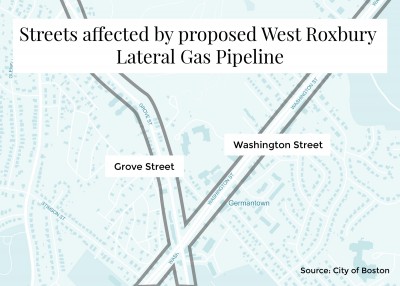Boston Mayor Martin Walsh announced a request for a rehearing to the Federal Energy Regulatory Commission’s decision to allow the installation of a Lateral Gas Pipeline in West Roxbury, according to an April 2 press release.

The proposed high pressure gas line, owned by Spectra Energy Partners as a part of their Algonquin Gas Transmission, is proposed to be constructed directly across the street from West Roxbury Crushed Stone, which is an active quarry that regularly uses dynamite, the release stated.
“I have listened to the concerns of the community, and we have asked Algonquin Gas and Spectra Energy several times to find a new route for this pipeline,” Walsh said in the release. “The project as proposed poses real public safety risks for West Roxbury residents, and we must work together with the community and with our city, state and federal partners to find a solution that is in the best interests of West Roxbury residents.”
Walsh was joined by U.S. Rep. Stephen Lynch, Massachusetts Sen. Michael Rush, Massachusetts Rep. Ed Coppinger, Boston City Councilor Matt O’Malley and the Boston City Councilors-at-Large in requesting the rehearing on behalf of the people of West Roxbury, the release stated.
Boston City Councilor-At-Large Michael Flaherty said he strongly opposes the project, on behalf of his West Roxbury constituents, citing significant and consistent outcry for the past several months.
“I can say that due to overwhelming public safety concerns expressed by West Roxbury residents, that Algonquin Gas needs to find an alternative route for their pipeline and their metering station,” Flaherty said. “Having a pipeline and metering station directly across from an active quarry that has regular blasting and will have regular blasting for the foreseeable future, is a recipe for disaster.”
Flaherty said the community has been outspoken regarding their concerns for the project, partially because of the lack of transparency associated with the project.
“At some point, FERC had a hearing and determined that this was an appropriate route, and then once the people who I represent, which is when the good people of West Roxbury, got wind [of the pipeline’s construction], that was when, from my perspective, the community process started,” Flaherty said. “There was no community process prior to that. It was a decision made by FERC.”
A 2014 explosion in several New York apartment buildings, which involved a broken pipeline, only solidified Flaherty’s stance regarding the construction.
“There was a pipeline, and there was a break in the pipeline, and there was activity, and the next thing you know, there was a massive explosion,” he said. “FERC should be looking in non-residential areas to locate these pipelines, and whoever suggested or thought that an appropriate or safe location would be to place a pipeline and metering station across from an active quarry that undergoes regular blasting was short-sighted to say the least.”
Flaherty stressed that he would stand beside his constituents, advising them to the best of his ability regarding the issue.
“I plan to stand with the people of West Roxbury, and whatever efforts they deem necessarily appropriate to stop the pipeline,” he said. “It’s their neighborhood, it’s their community, so I’ll be continuing to take advice from my constituents and what steps they would like to pursue and identify ways that I and other elected officials can help the situation.”
The lawmakers had not received a response to the request as of Monday afternoon, Flaherty said.
Matthias Ruth, interim director of the Northeastern University School of Public Policy and Urban Affairs, said this controversial issue is one that should not be examined just in the context of West Roxbury, but across the nation.
“We all like to have a cheap, reliable supply of energy, and any community, be it Roxbury or any of the communities through which the pipeline runs,” Ruth said. “What the Roxbury case and others really highlight is as society, we are at this point where we really need to think, do we continue to push the old technologies with methods of delivery and extraction that we know already are not sustainable environmentally, but also clearly, as Roxbury points out, not sustainable socially, because the local communities are adversely affected.”
Ruth also said he supports a rehearing regarding the pipeline because of larger issues at play that are outside of the community.
“If we can take stock of who wins and who loses — and it’s pretty obvious in this case, the environment loses, the local community is losing, and sort of the only ones who win are a small set of the business community — this is a good time to ask those tough questions and look to put in place an alternative strategy,” he said. “At the bare minimum, that call for a revisiting of the decision needs to bring with it a very clear, transparent communication of why [it was decided from the beginning].”
Several residents and students said the rehearing would provide a useful forum for rethinking the pipeline, which could potentially reduce the impacts on West Roxbury’s environment and community.
Tiffany Smith, a junior in Boston University’s Sargent College of Health and Rehabilitation Sciences, said the costs and benefits of installing the pipeline should be weighed before a decision is made.
“[They should] think about the danger to the surrounding community or cost-benefit analysis,” she said. “That’s how I think of everything.”
David Watson, 27, of Brighton, said rethinking the decision would be beneficial and getting a second opinion might prove helpful to making the right choice.
“Whatever is best for the environment would be the best thing to do,” he said. “This sounds like if they’re trying to do some digging where they’re digging, it’s probably not the best plan so taking a second look at things is always a good idea. It’s never a bad idea to reconfigure and figure out what the right thing to do is.”
Isaak Jones, 24, of Brighton, said the government is doing the right thing for residents by requesting a rehearing, and everyone should have a voice in the decision.
“Public safety needs to come first, and what it really comes down to is the residents, and they need to weigh the economic benefits of public safety and having a pipeline across the street from a quarry that is actively blasting, and with aboveground access, as I understand,” he said. “Having a re-polling or rehearing, this is a government that is representing us. Everyone should get their voices out and everything should be on the table before proceeding with something potentially dangerous.”












